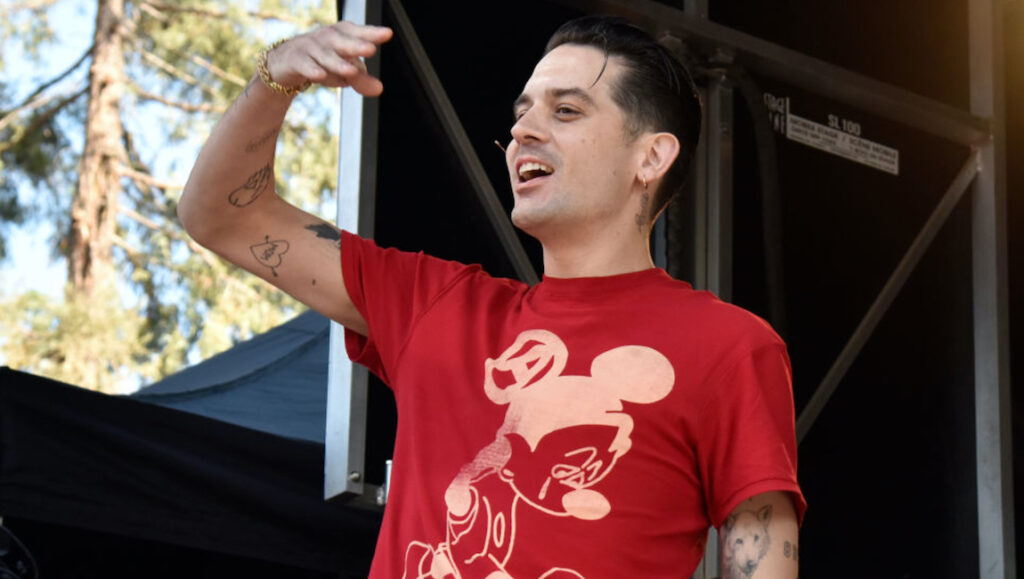These Things Happen Too is a dud of an album, full of performative soul-bearing and rife with G-Eazy’s insecurity about his rap credentials.
By the time Macklemore (and Ryan Lewis) got around to making their second, career-killing album, This Unruly Mess I’ve Made, it had already been clear for some time that their successes were entirely tethered to the cultural moment (i.e. 2012) into which they delivered their first album, The Heist. This was the same moment that sustained fun. and their very bad Some Nights; a culture too cringe to persist, and, inevitably, the Macklemore and Lewis approach to rap music failed to make any long-standing impact, the music on The Heist now mostly serving as a sad monument to the gleeful, corny obliviousness that characterized American pop art heading into Obama’s second term. But, where Macklemore and Lewis tanked, G-Eazy has been able to carve out a lane of some sort, working out a less pathetic take on their “humble white guy rapper” persona while engaging more directly with broader hip hop culture. That said, Gerald Eazy’s career has its origins in music no less embarrassing than the Macklemore/Lewis output, his initial popularity originating with his 2011 mixtape The Endless Summer, a gimmick release that had him styled like a greaser and rapping over beats built off prominent ’50s doo-wop samples. G-Eazy was quick to retire this aesthetic, but he’s never been able to completely shake it despite his seemingly Mac Miller-inspired pivot toward rap credibility a few short years later on 2014’s These Things Happen.
Doubts about his own legitimacy still plague G-Eazy all these years later on his latest project, These Things Happen Too, though he’s also now haunted by memories of aforementioned friend and mentor Miller, whose tragic, untimely passing is a frequent subject here. Over the course of the album’s 19 tracks and hour-long runtime (although there’s also a 29-track deluxe version where features from Chris Brown and Torey Lanez have been relegated), G-Eazy oscillates between Macklemorian talk-rap introspection about his place in the industry, heartfelt tributes to fallen friends and family, and embittered Drake type screeds against various exes — most of these songs indistinguishable from the next, despite being helpfully sequenced into thematic sections echoing the above descriptors. At this point in his career, G-Eazy is a competent enough rapper, though his range is limited and flow largely unchanging, which becomes problematic for him on most songs with a feature; Weezy casually washing him on the hook and feature of track two (“When Your Gone”) while E-40, SOB X RGE’s Datboii, and ShooterGang Kony run away with “Now, Later, Next,” These Things Happen Too’s sole excellent song. Good as it is, “Now, Later, Next” exemplifies G-Eazy’s continued defensiveness around his artistic and genre credentials, one of numerous songs on this album and throughout his body of work that was clearly conceived to reassert his right to claim Bay Area rap culture.
This doubt and anxiety underpin much of the music on These Things Happen Too, but not in an interesting way, hollowing out moments of bravado (“Origami”), letting some occasionally hard-hitting production pick up his slack. While a lot of the lyrical content positions G-Eazy as an outsider in the industry, it’s pretty clear that he really has no idea where he stands, most of these songs totally primed to hit the charts (especially the cheesy Demi Lovato-featuring “Breakdown”). Amusingly (but maybe not unexpectedly), G-Eazy is most convincing in the Macklemore-cornball mode, penultimate track “Time” presented as an epistolary song that has him writing to Miller and a deceased family member. Dopey, but apparently genuine, it’s the one moment on These Things Happen Too where G-Eazy maybe, actually opens up on an album full of otherwise performative soul-bearing. Still, it’s hard to say whether or not there’s any side of this artist that could really fuel an album’s worth of material.
Published as part of Album Roundup — September 2021 | Part 3.


Comments are closed.